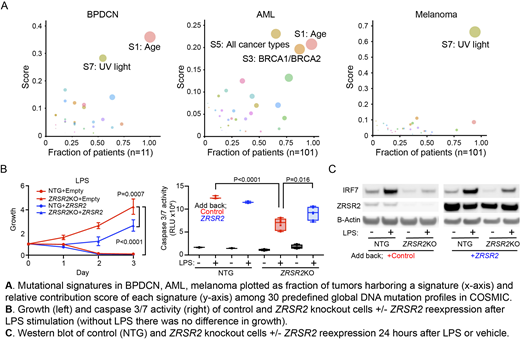Blastic plasmacytoid dendritic cell neoplasm (BPDCN) is an aggressive, male-biased (>3:1 M:F) hematologic malignancy in which some patients have bone marrow involvement at diagnosis (50%) and most have tumor formation in the skin (~90%), often preceding marrow disease. The prognosis is poor (median survival of 12-24 months) and there is unmet need for biological insight. TET2, ASXL1, and RNA splicing genes (SRSF2, SF3B1, and ZRSR2) are recurrently mutated in BPDCN. The X chromosome gene ZRSR2 was the most frequently mutated spliceosome gene reported in a prior BPDCN cohort (7 of 24, 29.2%; Taylor, ASH 2013). Our goal was to define the functional consequences of ZRSR2 mutations in BPDCN.
First, we confirmed the frequency of ZRSR2 mutations in a larger cohort from the US and Europe; we found ZRSR2 mutations in 24 of 93 (25.8%). Notably, ZRSR2 mutations were almost exclusively in males (23/73 males vs 1/20 females, P=0.019). Next, we compared the global mutation pattern to 30 predefined signatures from >7000 cancers in COSMIC. Analysis of all somatic single nucleotide variants in 11 tumor-normal pairs using whole exome sequencing (tumor was sorted BPDCN cells from marrow) revealed that BPDCN had an ultraviolet (UV)-induced mutation signature (score >0.25 in 6/11 or 55%; Figure 1A). For comparison, we detected the UV signature in melanoma but not in AML from The Cancer Genome Atlas. These data suggest that mutations acquired in the skin stage of BPDCN evolution are retained in subsequent leukemic disease.
Next, we performed RNA-sequencing from sorted BPDCN and normal plasmacytoid dendritic cells (pDCs). Differentially expressed genes between BPDCN and pDCs (BCL2, MYB, IRF4, CEP70, IGLL1, GZMB) were similar to those that distinguish BPDCNs from pDCs by bulk and single cell RNA-sequencing. By gene set enrichment analysis (GSEA), BPDCNs were enriched for overexpression of MYC/E2F targets and PI3K/AKT/MTORC1 signaling pathway-associated genes. BPDCNs transcriptomes were also enriched for gene sets associated with RNA splicing machinery and RNA nonsense mediated decay (NMD).
To link RNA splicing with functional consequences of ZRSR2 mutations, we generated ZRSR2-knockout BPDCN cells (CAL1) using CRISPR/Cas9. This models primary tumors because ZRSR2-mutant BPDCNs have complete loss of ZRSR2 protein. Activation marker (CD80) upregulation and type 1 interferon secretion after Toll-like receptor (TLR) stimulation with lipopolysaccharide (LPS) or R848 were reduced in ZRSR2-deficient cells. We found similar defective cytokine production in stimulated primary BPDCN cells compared to normal pDCs. After activation, normal pDCs undergo apoptosis in a negative feedback process. In contrast, ZRSR2-knockout, but not control cells, were protected from TLR activation-induced apoptosis. Reexpression of wild-type ZRSR2 in knockout cells restored activation-induced apoptosis (Figure 1B).
These data suggested that ZRSR2-mutant BPDCNs have defects downstream of TLR stimulation. By RNA-sequencing, we found that IRF7 mRNA was mis-spliced in all ZRSR2- (2/2), SRSF2- (4/4), and SF3B1- (1/1) mutant BPDCNs compared to those with no mutated splicing gene (4/4). IRF7 (interferon regulatory factor 7) is a transcription factor activated by TLR signaling that is important for pDC activation and apoptosis. The IRF7 mRNA transcript contains a "weak intron" (intron 4) that is subject to intron retention, which leads to NMD and reduced IRF7 protein level in stimulated dendritic cells (Luke, Mol Cell 2019). IRF7 intron 4 was mis-spliced in ZRSR2-, SRSF2-, and SF3B1-mutant BPDCNs. ZRSR2-knockout CAL1 cells had severely impaired ability to upregulate IRF7 after LPS stimulation, which was partially rescued by reepxression of wild-type ZRSR2 (Figure 1C). Expression of constitutively activated IRF7 inhibited growth of both ZRSR2-knockout and control cells, confirming that the inability to activate IRF7 is important for the effect of ZRSR2 loss on TLR agonist-induced growth inhibition.
In conclusion, male-biased ZRSR2 mutations are frequent in BPDCN and impair pDC activation and apoptosis, at least in part via TLR-IRF7. These data may explain why BPDCNs have an impaired activation state (Bierd, BCJ 2019). They also suggest that splicing factor mutations affect cell type-specific pathways to promote transformation, underscoring the importance of studying cancer genes in relevant contexts.
Griffin:Moderna Therapeutics: Consultancy. Ghandi:Monte Rosa Therapeutics: Consultancy; Cambridge Data Science LLC: Current Employment, Current equity holder in private company. Seiler:Remix Therapeutics: Current Employment. Konopleva:Reata Pharmaceutical Inc.;: Patents & Royalties: patents and royalties with patent US 7,795,305 B2 on CDDO-compounds and combination therapies, licensed to Reata Pharmaceutical; Eli Lilly: Research Funding; Genentech: Consultancy, Research Funding; Agios: Research Funding; Rafael Pharmaceutical: Research Funding; Sanofi: Research Funding; AbbVie: Consultancy, Research Funding; Forty-Seven: Consultancy, Research Funding; AstraZeneca: Research Funding; Ascentage: Research Funding; Calithera: Research Funding; Amgen: Consultancy; F. Hoffmann La-Roche: Consultancy, Research Funding; Cellectis: Research Funding; Ablynx: Research Funding; Kisoji: Consultancy; Stemline Therapeutics: Consultancy, Research Funding. Pemmaraju:Cellectis: Research Funding; Daiichi Sankyo: Research Funding; DAVA Oncology: Honoraria; Plexxikon: Research Funding; Blueprint Medicines: Honoraria; Incyte Corporation: Honoraria; SagerStrong Foundation: Other: Grant Support; Celgene: Honoraria; Pacylex Pharmaceuticals: Consultancy; Affymetrix: Other: Grant Support, Research Funding; MustangBio: Honoraria; Roche Diagnostics: Honoraria; Novartis: Honoraria, Research Funding; LFB Biotechnologies: Honoraria; Stemline Therapeutics: Honoraria, Research Funding; AbbVie: Honoraria, Research Funding; Samus Therapeutics: Research Funding. Abdel-Wahab:H3 Biomedicine Inc.: Consultancy, Research Funding; Merck: Consultancy; Janssen: Consultancy; Envisagenics Inc.: Current equity holder in private company. Lane:Qiagen: Consultancy; Abbvie: Research Funding; Stemline Therapeutics: Research Funding.
Author notes
Asterisk with author names denotes non-ASH members.


This feature is available to Subscribers Only
Sign In or Create an Account Close Modal